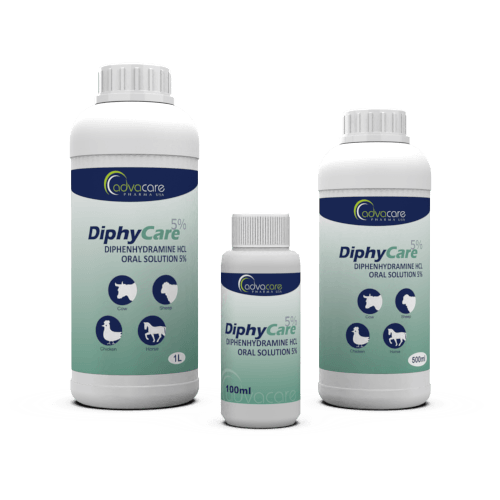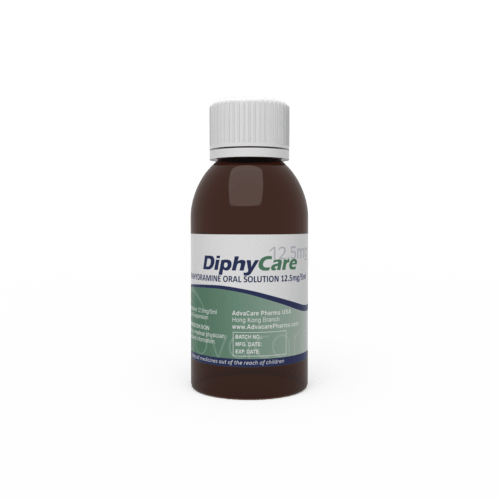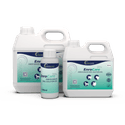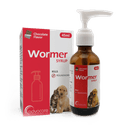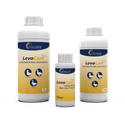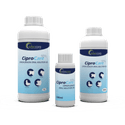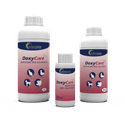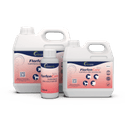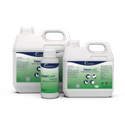- Home›
- Veterinary Pharmaceuticals›
- Veterinary Solutions and Suspensions›
- Veterinary Oral Solutions›
- Diphenhydramine Oral Solution
Diphenhydramine Oral Solution
Dosage
Packaging
What is Diphenhydramine Oral Solution?
Active Ingredients: Diphenhydramine HCl
Diphenhydramine Oral Solution is an antihistamine drug used to treat acute inflammatory and allergic conditions in poultry, sheep, horses, cows and dogs. It can be used to treat hives or itching or in the treatment of insect or snake bites. This drug is sometimes used for its sedative properties.
Diphenhydramine is an antihistamine or an H1 blocker. It works by inhibiting the action of histamine at the H1 receptors, which are found throughout the body including in the skin, lungs, and gastrointestinal tract. Histamine, a natural substance produced by the body, is involved in allergic reactions and symptoms like itching, hives, and swelling. By blocking histamine's effects at the H1 receptors, diphenhydramine reduces these symptoms, providing relief from allergic conditions.
The drug's effectiveness extends to its use as a mild sedative due to its ability to cross the blood-brain barrier. This quality makes it useful in reducing anxiety and motion sickness, especially during travel. It's the sedative properties that also contribute to some of its common side effects like drowsiness or sedation.
Diphenhydramine is also sometimes used in emergency situations, like in the treatment of insect or snake bites, where it can help mitigate acute allergic reactions.
It is important to note that this formulation of AdvaCare's Diphenhydramine Oral Solution is for veterinary purposes only.
AdvaCare Pharma is a global supplier of Diphenhydramine Oral Solution. AdvaCare excels at the production of high-quality yet cost-effective treatments. This medication has been manufactured in our GMP-certified facilities located in China, India, and the USA.
Why are we a quality Diphenhydramine manufacturer?
AdvaCare Pharma, an American company, is a quality manufacturer of Diphenhydramine Oral Solution for veterinary use. We are committed to the manufacture and global distribution of over 250 GMP-certified veterinary medicines, including 70+ oral liquid formulations.
As a trusted Diphenhydramine manufacturer, our approach to supply chain management is systematic and data-driven. We provide unparalleled support to our veterinary distributors, assisting with document and product registration, supply chain coordination and market share growth.
Uses
What is Diphenhydramine used for?
It's used to treat inflammatory and allergic conditions, such as
- allergies
- hives
- eczema
- coughing
- sudden shock or laminitis
- dyspnea
It is also used to reduce travel anxiety and motion sickness. Its calming effect can make travel and transportation less stressful for animals, particularly those prone to anxiety or discomfort during car rides or flights.
What animals can be treated with Diphenhydramine Oral Solution?
It's recommended for cows, dogs, horses, poultry, and sheep. It should be noted that the oral solution of diphenhydramine is more suitable for monogastric animals than ruminants because monogastric animals, like dogs and horses, have a single-chambered stomach where the medication can be efficiently absorbed. In contrast, ruminants like cows and sheep have a complex, multi-chambered stomach system, which can affect the drug's absorption and metabolism.
How is a Diphenhydramine Oral Solution used?
This medication has been manufactured as a liquid, which is packaged in a bottle. It is intended for oral administration.
What is the withdrawal period for Diphenhydramine?
The withdrawal time for this medicine is at least 7 days after the final treatment. For cattle or sheep, there have been some recorded withdrawal periods of up to 28 days, so the exact duration will depend on local regulations.
What are the signs that Diphenhydramine is starting to work?
For allergic reactions such as hives or itching, there should be a noticeable reduction in these symptoms, with the skin appearing less irritated and a decrease in scratching or licking. If used for respiratory issues like coughing or difficulty breathing, the animal will likely show improved breathing and reduced distress. In cases where diphenhydramine HCl is administered for its sedative properties, such as in managing travel anxiety or motion sickness, the animal will appear calmer, with less pacing, whining, or agitation.
How quickly does Diphenhydramine start working in animals?
The onset of action can vary, but generally, effects can be seen within 30 minutes to an hour after oral administration. The duration of effect also varies but can last for several hours.
Can Diphenhydramine Oral Solution be used in pregnant or lactating animals?
The use of this drug in pregnant or lactating animals should be approached with caution. Consult a veterinarian, as the effects can vary depending on the animal and the stage of pregnancy or lactation.
Are there any contraindications for using Diphenhydramine in animals?
Possibly. It should be used cautiously in animals with certain conditions such as glaucoma, prostate enlargement, heart disease, high blood pressure, and hyperthyroidism. Also avoid using it in animals allergic to antihistamines.
Can Diphenhydramine interact with other medications?
Yes, it can interact with other drugs, such as certain sedatives, tranquilizers, and other central nervous system depressants. Seek veterinary advice first before administering it.
Can Diphenhydramine be used in conjunction with vaccines?
While it is sometimes used to mitigate allergic reactions to vaccines, a veterinarian should be consulted first for safety.
How should Diphenhydramine Oral Solution be stored?
This medication should be stored in a dark, dry location between 20-25°C. The vial should be sealed tightly.
Dosage
How much Diphenhydramine Oral Solution should be given to livestock animals?
The usual dose is 1ml per 10kg of body weight. The dosage also depends on the animal's species and the current medical condition.
How much Diphenhydramine Oral Solution should be given to horses?
The usual dose is 2-4mg per kg of body weight, given twice per day.
How much Diphenhydramine Oral Solution should be given to dogs?
The typical dose is about 2-4mg per kg of body weight, given 2-3 times a day.
How much Diphenhydramine Oral Solution should be given to poultry?
The usual dose for poultry is 2-4mg/kg given orally by mouth, or 2mg/l drinking water, every 12 hours.
How much Diphenhydramine Oral Solution should be given to sheep?
The typical dose is 40-60mg per kg of body weight.
What should be done in case of accidental Diphenhydramine HCl overdose?
Contact a veterinarian or an emergency animal clinic right away. Do not induce vomiting unless specifically instructed, as this can sometimes cause more harm. When you contact the vet, provide detailed information about the amount of the drug ingested, the time of ingestion, and any symptoms. The veterinarian will give instructions and may need to administer treatments such as activated charcoal or supportive care depending on the severity.
Refer to a veterinary doctor or pharmacist for guidelines on dosage.
Side Effects
As with all pharmaceuticals, some unwanted effects can occur from the use of Diphenhydramine Oral Solution.
Some reported side effects are as follows:
- lethargy or sedation
- dry mouth
- urinary retention
- gastrointestinal effects in cats
- excitability, loss of appetite, tremors at high doses
Immediate veterinary help should be sought in case these serious side effects manifest:
- severe allergic reactions: symptoms like swelling of the face, hives, or difficulty breathing may indicate a serious allergic reaction.
- extreme lethargy or unresponsiveness: if the animal becomes excessively lethargic or unresponsive, it could be a sign of an overdose or severe reaction.
- seizures or severe tremors: these could indicate a toxic level of the medication in the animal's system.
- difficulty urinating: this could be a sign of urinary retention reaching a dangerous level.
- persistent or severe gastrointestinal symptoms: continuous vomiting, diarrhea, or refusal to eat could lead to dehydration or other complications.
For a comprehensive list of all possible side effects of this medication, consult a veterinarian.
Precautions
Do NOT use Diphenhydramine Oral Solution for an animal that:
- has a known allergy or hypersensitivity to any of the ingredients.
- is a very young or neonate.
Treatment with this drug should be administered with caution if an animal:
- has conditions such as glaucoma, prostate enlargement, intestinal obstruction, heart disease, or hypertension.
- has elevated thyroid hormones.
- has a respiratory problem.
- is pregnant or lactating.
- is a working dog.
- is geriatric.
There are known interactions between diphenhydramine and other drugs, including anticholinergic drugs, tricyclic antidepressants, and CNS depressants.
This medicine can affect the results of a skin allergy test. Treatment should stop at least 2 weeks prior to this kind of test.
As ruminants have a low oral absorption efficiency of this medicine, it is not recommended to treat them with the oral solution.
What are the most common animals Diphenhydramine Oral Solution is used for?
Diphenhydramine Oral Solution is used on different types of animals, such as:
- Cows: Diphenhydramine Oral Solution is often used in cows to treat allergic reactions, such as those caused by insect bites or certain foods. It can also be used as a mild sedative for procedures or to alleviate symptoms of motion sickness during transport.
- Dogs: In dogs, this drug is commonly used to alleviate symptoms of allergies, including itching, runny nose, and sneezing. It can also be used to prevent motion sickness and as a mild sedative.
- Horses: For horses, the drug is primarily used to treat symptoms of allergic reactions, such as hives, itching, and swelling. It may also serve as a sedative for minor procedures or during transportation.
- Poultry: In poultry, Diphenhydramine HCl is typically used to manage symptoms of allergic reactions, such as swelling and itching. Its sedative properties may also be utilized under specific circumstances.
- Sheep: Sheep are often given this drug to manage allergic reactions, particularly skin irritations and inflammations. Additionally, it can be used as a light sedative when necessary.

You might be interested in...
Why AdvaCare Pharma?
As an industry leader, we are aware of our responsibility to provide affordable and sustainable solutions to improve healthcare worldwide.
